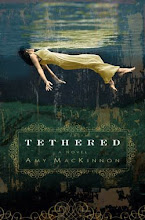Making A Literary Life Friday: Our Debut

Tuesday night, to an encouraging audience of fellow writers, The Writers' Group made its debut. Amy, Lisa, Lynne and Hannah (pictured at right) shared how the group works and the various ways we support each other as we live our unique literary lives.
Lisa
Determination. That best defines the theme of our presentation as a writers'group. We have been determined to have ground rules as a writers'group, to meet expectations for quantity and quality of our work, to offer support to each other unconditionally. I left our talk Tuesday feeling more determined than ever myself. To write, to publish, to live a literary life.
Amy
Forget designer shoes, good food, vacations in paradise (okay, I would like to go to Rome), what I find most tempting is a debut. This week I bought Book Sense's #1 pick for June, The Blood of Flowers by Anita Amirrezvani. I've been looking forward to this book for months and now it's mine. Free Food for Millionaires by Min Jin Lee is next on my list (she'll be at Buttonwood Books in July, call for reservations). The reviews have been stunning for both novels. And lastly, the lovely and oh-so-talented debut author Hank Phillippi Ryan not only made it to the Boston Globe's Bestseller List with her debut Prime Time just 12 days after its release, but Publishers Marketplace just reported another two-book deal for Hank. Congratulations! And thanks to "Five" -- and everyone else -- for coming out to Grub Street South. "Five" trekked all the way from Boston, and brought me a book to boot. How kind!
Hannah
I continue with Ruth Reichl's Comfort Me with Apples, which is a great read, summer or otherwise, for those who love food, anecdotes about soul and destiny, and glimpses into the upper strata of the restaurant world. For anyone who missed Shauna Roberts' comment this week on the subject of how to know when you are in the right writers' group and what to do if you're not, check out her sister posting at http://shaunaroberts.blogspot.com/.
Lynne
This week I started reading the wonderful novel, My Latest Grievance by Elinor Lipman. She is genius when it comes to craft, especially humor and characterization. Reviewers call her novel, Austen-like in style. I had a delightful conversation with friend of our blog, Judy Merrill Larsen. We shared our literary journeys, along with all we've learned so far. Check out her blog, there you'll learn a lot about the art and science of writing. Do read her book, All the Numbers, its a great read; and remember she's available to join your book group.





